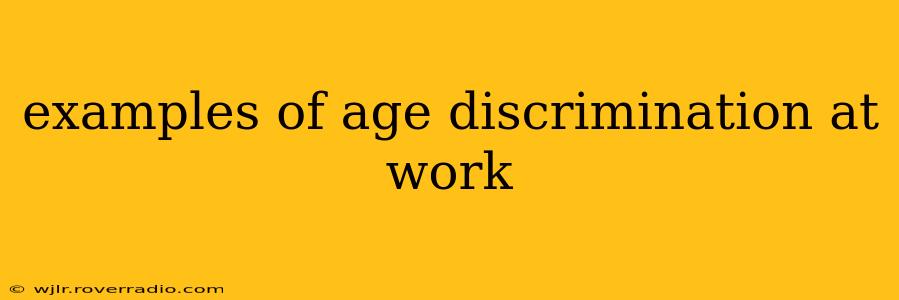Age discrimination in the workplace is illegal in many countries, yet it remains a pervasive issue. Understanding what constitutes age discrimination is crucial for both employees and employers. This article provides examples of age discrimination, explains the subtle ways it can manifest, and offers guidance on how to address it.
What Constitutes Age Discrimination?
Age discrimination occurs when an individual is treated unfairly because of their age. This isn't limited to older workers; younger employees can also face discrimination. The key is that the age is the reason for the unfair treatment, not legitimate business reasons like performance or qualifications. This discrimination can take many forms, including:
-
Direct Discrimination: This is the most overt form, where an employer explicitly states a preference for younger workers or makes ageist remarks. For example, an employer saying, "We need someone younger and more energetic for this role," is direct discrimination.
-
Indirect Discrimination: This is more subtle and involves policies or practices that appear neutral on the surface but disproportionately disadvantage older workers. An example could be requiring extensive travel for a position, which might be more difficult for older employees with family responsibilities or health concerns.
-
Harassment: This involves offensive or humiliating behavior related to age. This could include jokes, offensive comments, or derogatory remarks about an employee's age.
Examples of Age Discrimination in Different Workplace Scenarios:
Here are some examples demonstrating the different ways age discrimination can manifest:
Hiring and Recruitment:
- Rejecting applications from older candidates: An employer consistently discarding resumes from applicants over a certain age, without giving them a fair chance at an interview.
- Using ageist language in job descriptions: Phrases like "recent graduate" or "dynamic and energetic" can unintentionally exclude older, experienced candidates.
- Favoritism towards younger candidates during interviews: Asking questions that are irrelevant to the job but geared toward assessing youthfulness or energy levels, such as "How do you stay up-to-date with the latest trends?"
Training and Development:
- Excluding older employees from training opportunities: This can limit their skills and future career prospects, pushing them towards obsolescence.
- Offering less challenging assignments to older workers: This can lead to stagnation and a decrease in job satisfaction.
Performance Management and Promotion:
- Unfair performance reviews based on age: An older worker consistently receiving negative reviews despite consistently meeting or exceeding expectations, while younger colleagues with similar performance receive positive feedback.
- Passing over older employees for promotions: Despite having greater experience and qualifications, older employees are consistently overlooked for promotions in favor of younger colleagues.
- Mandatory retirement policies (where illegal): Forcing employees to retire at a specific age, even if they are capable and willing to continue working.
Compensation and Benefits:
- Paying older employees less than younger colleagues for the same job: This constitutes a clear violation of equal pay legislation.
- Denying older employees access to training or development opportunities that would improve their compensation: This limits their earning potential compared to younger colleagues.
Retrenchment and Redundancy:
- Targeting older employees during layoffs: An employer disproportionately laying off older employees, particularly those with higher salaries and longer tenures, to cut costs.
What to Do if You Suspect Age Discrimination:
If you believe you are a victim of age discrimination, it is crucial to document everything: dates, times, names of individuals involved, specific comments made, and any other relevant information. You should also consult with an employment lawyer or an organization that specializes in workplace rights to understand your options and pursue legal action if necessary.
Frequently Asked Questions (FAQs):
How can I prove age discrimination?
Proving age discrimination can be challenging, but documenting every instance of unfair treatment, collecting evidence like emails, performance reviews, and witness testimonies, can strengthen your case.
What are the penalties for age discrimination?
Penalties vary depending on the jurisdiction but can include substantial fines, back pay, compensatory damages, and legal fees.
Can I file a complaint anonymously?
The possibility of filing an anonymous complaint depends on the specific laws and procedures of your location; it's best to consult with a legal professional.
What resources are available to help me?
Many organizations offer support and legal assistance to victims of workplace discrimination. Research organizations in your area specializing in employment rights.
This information is for general guidance only and should not be considered legal advice. Consult with a legal professional for advice specific to your situation and jurisdiction.
